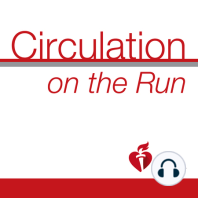18 min listen
Circulation October 18, 2022 Issue
ratings:
Length:
23 minutes
Released:
Oct 17, 2022
Format:
Podcast episode
Description
This week, please join author Sunil Rao and Guest Editor and Editorialist Gregory Lip as they discuss the article "A Multicenter, Phase 2, Randomized, Placebo-Controlled, Double-Blind, Parallel-Group, Dose-Finding Trial of the Oral Factor XIa Inhibitor Asundexian to Prevent Adverse Cardiovascular Outcomes After Acute Myocardial Infarction" and the editorial "Factor XIa Inhibition: Is It a Novel Alternative Antithrombotic Strategy for High-Risk ACS Patients?" Dr. Carolyn Lam: Welcome to Circulation on the Run, your weekly podcast summary and backstage pass to the journal and its editors. We're your co-hosts. I'm Dr. Carolyn Lam, Associate Editor from the National Heart Center and Duke National University of Singapore. Dr. Greg Hundley: And I'm Dr. Greg Hundley, Associate Editor Director of the Pauley Heart Center at VCU Health in Richmond, Virginia. Dr. Carolyn Lam: Greg, today's feature paper is about the factor XI inhibitor asundexian. It's the trial that we've been waiting for the PACIFIC-AMI trial. You really have to listen to it because these factor XI inhibitors are super interesting. What? We're going to tell you about the other papers in today's issue first. Aren't we, Greg? Do you want to go first? Dr. Greg Hundley: You bet, Carolyn. Thank you so much. Carolyn, did you ever consider the genetic underpinnings of venous thromboembolism? Well, as you know, venous thromboembolism is a complex disease with environmental and genetic determinants. And in this study, this large investigative team represented by Dr. Nicholas Smith from the University of Washington in Seattle, and their colleagues present new cross-ancestry meta-analyzed genome-wide association study results from 30 studies with replication of novel loci and their characterization through in silicone genomic interrogations. Dr. Carolyn Lam: Wow. Sounds like a really large effort, Greg. What did they find? Dr. Greg Hundley: Right, Carolyn. In the author's initial genetic discovery effort that included 55,330 participants with venous thromboembolism: 47,000 were European, 6,000 African, and a little over 1000 Hispanic ancestry. They identified 48 novel associations of which 34 are replicated after correction for multiple testing. In their combined discovery replication analysis, so that's 81,669 venous thromboembolism participants and ancestry stratified meta-analyses from the European, African and Hispanic ethnic groups. They identified another 44 novel associations, which are new candidate venous thromboembolism associated loci requiring replication. And many of the replicated loci were outside of known or currently hypothesized pathways to thrombosis. Carolyn, in summary, these findings from this very large GWAS analysis highlight new pathways to thrombosis and provide novel molecules that may be useful in the development of anti-thrombosis treatments with reducing the risk of bleed. Dr. Carolyn Lam: Wow. Super interesting and very related to that feature paper that we just discuss. But nonetheless, this next paper I love as well, if I may say so myself. It deals with frailty and as we know, frailty is increasing in prevalence. And because frail patients are often perceived to have a less favorable benefit risk profile, they may be less likely to receive new pharmacological treatments. And so, we and led by Professor John McMurray from the University of Glasgow, decided to investigate the efficacy and tolerability of dapagliflozin according to frailty status in the DELIVER trial. Dr. Greg Hundley: The DELIVER trial. Carolyn, tell us about the DELIVER trial? Dr. Carolyn Lam: Sure. In deliver dapagliflozin compared to placebo, reduced the risk of worsening heart failure events or cardiovascular death and improved symptoms in more than 6,000 patients with heart failure and mildly reduced and preserved ejection fraction, so ejection fraction above 40%. Now in this pre-specified analysis, we examine the efficacy and safety of dapagliflozin according to frailty statu
Released:
Oct 17, 2022
Format:
Podcast episode
Titles in the series (100)
Circulation November 28, 2017 Issue: Circulation Weekly: Your Weekly Summary & Backstage Pass To The Journal by Circulation on the Run
